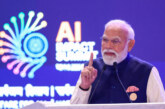Editor’s Desk*

A pall of uncertainty that had descended on the inaugural day of the commencement of COP26 in the absence of clear-cut announcements, especially from biggest emitting countries with regard to their commitments on net-zero goal, was unveiled by India’s Prime Minister Narendra Modi through his new five-fold strategy to demonstrate to the world India’s resolute determination to act decisively by leading the climate charge. Unfolding his five-fold strategy christened as Panch-Amrita, or five elixirs, PM Modi in his address to COP26’s World Leaders Summit said: “These five elixirs will be an unprecedented contribution by India towards climate action.”
The five-fold strategy as outlined by PM Modi contains promises that inter alia include:
- India will take its non-fossil energy capacity to 500 GW by 2030.
- India will meet 50 percent of its energy requirements from renewable energy by 2030.
- India will reduce the total projected carbon emissions by one billion tonnes from now till 2030.
- India will reduce the carbon intensity of its economy by less than 45 percent by 2030.
- India will achieve the target of Net Zero by the year 2070.

These are said to be significantly bold announcements from India, the world’s fourth largest emitter of CO2 after China, the US and the EU. Admittedly, India still depends on coal power plants for more than 50% of the country’s electricity needs; nevertheless, owing to India’s huge population, its emissions per capita are much lower than other major global emitters. In 2019, India emitted 1.9 tonnes of CO2 per head of population relative to 15.5 tonnes for the US and 12.5 tonnes for Russia that year. This is for the first that India has set for itself target timeframe for net-zero emissions. Admittedly, India’s target of 2070 is two decades later than what the US and EU have pledged (2050) and a decade more than China (2060); nevertheless, many economists and environmental groups have wholeheartedly welcomed India’s announcement.
While describing India’s initiative as the real climate action, one expert has opined that India has apparently put the ball in the court of developed countries.
Launch of Initiative for the Resilient Island States
Prime Minister Modi along with his British counterpart Boris Johnson launched the ‘Initiative for the Resilient Island States’ (IRIS) for developing infrastructure of small island nations, saying that “The launch of ‘IRIS’ gives a new hope, a new confidence,” and added that the initiative gives satisfaction of doing something for the most vulnerable countries. PM Modi congratulated the Coalition for Disaster Resilient Infrastructure (CDRI) for the initiative and said “It is the collective responsibility of all of us towards mankind. It is, in a way, a shared atonement for our sins”. British Prime Minister Johnson said that it is incredibly cruel that vulnerable, small island states are right in the frontline of loss and damage that is caused by global warming and that they have done virtually nothing to cause global warming. He said that the UK will financially help the initiative.
One Sun One World One Grid (OSOWOG) project
Another coalition between India and the UK has led to the launch of a ‘green grids’ initiative-the One Sun One World One Grid (OSOWOG) project. The project aims to connect grids from across borders to facilitate a faster transition to the use of renewable energy. PM Modi spoke about the project said that, “If the world has to move to a clean and green future, these interconnected transnational grids are going to be critical solutions. One Sun, One World & One Grid will not only reduce storage needs but also enhance the viability of solar projects. This creative initiative will not only reduce carbon footprints and energy cost but also opens a new avenue for cooperation between different countries and regions”.
India has assured its earnest cooperation to the international community in combating climate change. Most of the ambitious targets announced by PM Modi at COP26, with the exception of net-zero target, entail a 2030 deadline. Irrespective of numerous handicaps, India has offered to march along with its peers in the developed world to achieve climate goals.India’s role at COP26 has been hailed by the international media. BBC provided a standalone coverage to PM Modi’s announcement on net-zero. Euractiv also published a standalone news on PM Modi’s commitment on net-zero target. Time also provided a detailed positive coverage of India’s role at COP26.
*Dr. Arvind Kumar, Editor, focusglobalreporter.org



